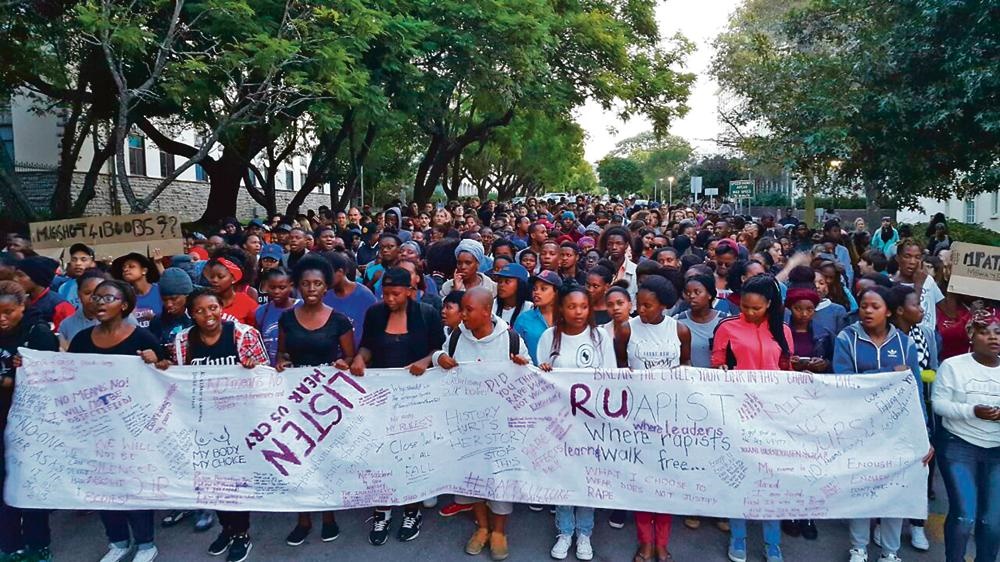
In my second year at Wits University, I moved into a women residence. One night after supper, three of my res friends and I cuddled up in Xoliswa’s* room.
I don’t know how we got onto the subject of rape, but that night it moved from being an external discussion to a place where each of us admitted to one another: “This happened to me, too.”
It was a shock to all of us in that room. “You too?” The sharing went beyond the actual violation in the sexual act to lingering experiences of trauma, depression and difficulties in building romantic relationships and intimacy after our rapes.
We began sharing parts of ourselves that we hadn’t shared with our mothers, siblings or even reported to the police.
One of us had reported her rape and, in that process, like many sexual assault survivors, had experienced intense secondary victimisation from law enforcement officers, which became so overwhelming that she gave up the case.
This happened when she was just in primary school. We shared plenty of tears and feelings of helplessness, the walking wounded.
Since then, I’ve had many similar conversations with friends, colleagues and other women from the #FeesMustFall movement, and like many others, I attended the launch of Pumla Dineo Gqola’s book Rape: A South African Nightmare.
In these spaces of safety, many others uttered the words: “This happened to me too.”
Rape in our national discourse is often deemed as just another “issue” or “rumour”, yet rape for us – millions of South African women, queer women, men and gender nonconforming bodies – is a lifelong and inescapable trauma.
We are human bodies behind the statistics, both reported and unreported, that belong to the world’s rape capital.
When the #RUReferenceList protest broke out on Sunday night, those of us who were far away stayed up to follow this historic moment.
Many young women and rape survivors on my Twitter timeline were deeply triggered. We sent each other direct messages on Twitter, “Are you okay?”, knowing very well we were not. “I can’t stop crying,” came a reply.
But beyond the tears, we felt affirmed, proud because the women at the university currently known as Rhodes were standing up for all of us. When they went to fetch those men who the list accused of committing rape, they were ensuring that there is a “social cost” to rape.
I was thankful to know that other rapists and potential rapists were watching this from around the country and bearing witness to a challenge to a social system that still wants to let sexual assault be swept under the carpet.
In her book, Gqola recalls a TV show she watched that featured men who had committed rape. None of these men “wanted to admit that it [rape] was violence that had far-reaching effects, that they could ruin women’s lives, and that rape traumatises”.
She writes that the men “reported not suffering any real consequences themselves from a life of serially raping women”.
Men’s actions in the violations of women’s bodies had no “social cost” for, as Gqola observed, “none of their relationships had suffered. They had not been ostracised or stigmatised. Even when coming out of jail for rape convictions”.
Rapper Simiso Zwane, also known as OkMalumKoolKat, was convicted of sexual assault in Australia. This man has only served one month of his six-month jail sentence.
He has gone on to be offered performing gigs and media interviews, and has been able to continue with his life.
We have also witnessed, for instance, how life continued for Jacob Zuma, who went on to become president, while Khwezi was exiled, as the One in Nine campaign continues to remind us.
Khwezi is the woman who was raped by Jacob Zuma, I say “was raped” because, like many women in this country, I believe Khwezi, and the One in Nine movement that has supported Khwezi through the trial and afterwards.
[Editor’s note: On May 8 2006, the court dismissed the charges against Zuma, agreeing that the sexual act in question was consensual.]
Khwezi was failed by the criminal justice system and other members of society. Zuma has gone on to lead this country with no social consequence.
In both these men’s cases, both convicted and acquitted, they have proven to us what Gqola also argues: that rape continues “because it works to keep patriarchy intact. It communicates clearly who matters and who is disposable”.
Young feminists this week showed the whole nation that perpetrators of rape cannot continue to be protected and unnamed. They demonstrated to us that our pain has been negotiable for too long.
They work towards a future when young women no longer have to say: “This happened to me too.”
*Not her real name
Dlakavu is a masters student in African literature and a Fallist




 Publications
Publications
 Partners
Partners








